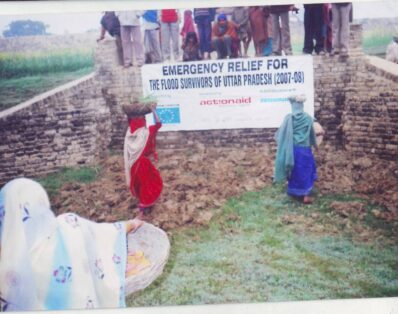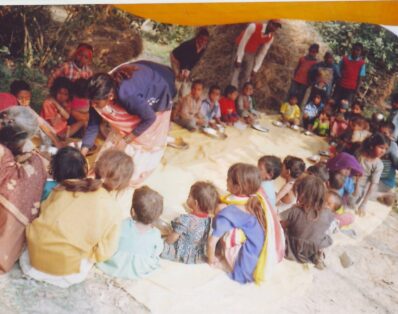Cash for Work Program for Flood-affected Communities
Following the devastating floods of July 2007, the region saw widespread damage, particularly to agriculture, leaving many local residents without livelihoods. With crops destroyed and no immediate means of income, Swabhiman Samiti, in collaboration with ActionAid India, initiated a Cash for Work (CFW) program to help the affected community restore basic infrastructure and generate employment opportunities.
- Objective of the Cash for Work Program:
The Cash for Work program aimed to:
- Provide immediate employment opportunities to flood-affected families.
- Restore vital infrastructure, including roads, bridges, and other community assets that were damaged during the flood.
- Generate daily wages for workers, helping them support their families during this crisis.
- Provide a safe work environment with basic amenities such as drinking water, first aid, and childcare facilities.
- Implementation of the Program:
In partnership with ActionAid India, Swabhiman Samiti organized development work under the Cash for Work scheme. The following key activities were carried out:
2.1 Reconstruction and Restoration:
- The primary task of the program was to repair and restore the infrastructure damaged by the floods. This included filling the gaps in collapsed bridges and fixing damaged pathways.
- 2281 workdays were created as a result of this program, which allowed local workers, including men and women, to participate in the rehabilitation process.
2.2 Daily Wage and Work Conditions:
- Workers were paid a daily wage of ₹100, which was above the standard wage rate and provided an essential source of income for the flood-affected community.
- The program helped provide temporary employment while also enabling workers to contribute to the restoration of their community.
- Workplace Amenities and Facilities:
To ensure the safety and well-being of the workers, particularly women and children, Swabhiman Samiti and ActionAid India took several important steps to make the workplace more conducive to healthy working conditions:


3.1 Provision of Health and Safety Measures:
- First aid stations were set up at the worksite to address any immediate medical needs.
- Clean drinking water was provided to ensure that workers remained hydrated, especially in the harsh post-flood conditions.
3.2 Childcare Facilities:
- In recognition of the challenges faced by women workers, the program also arranged childcare facilities such as balwadis (daycare centers), where children could be taken care of while their mothers worked.
- This ensured that women had the opportunity to work while knowing their children were safe and cared for.
- Impact of the Program:
The Cash for Work program had a significant positive impact on both the community and the local economy:
- Income Generation: The program provided essential income to flood-affected families, helping them meet basic needs such as food and shelter during a difficult time.
- Community Infrastructure: The work undertaken helped restore important infrastructure, such as bridges and roads, making it easier for people to access essential services and rebuild their lives.
- Women’s Empowerment: By involving women workers in the restoration efforts and providing facilities like childcare, the program contributed to empowering women, giving them both an income and a sense of purpose.
- Conclusion:
The Cash for Work program, in partnership with ActionAid India, played a vital role in providing both employment opportunities and community infrastructure restoration in the aftermath of the devastating 2007 floods. It not only supported flood-affected families but also ensured that the women and children were looked after while the work was being carried out.
Swabhiman Samiti remains committed to continuing such initiatives, aiming to improve the livelihood opportunities of vulnerable populations and build resilience in the face of future challenges.






